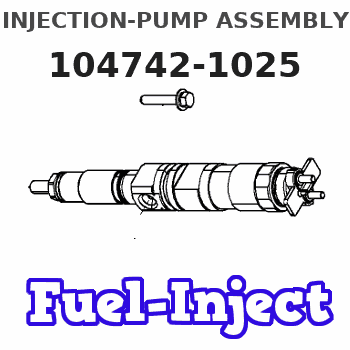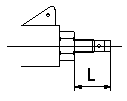Information injection-pump assembly
ZEXEL
104742-1025
1047421025
ISUZU
8944079184
8944079184

Rating:
Cross reference number
ZEXEL
104742-1025
1047421025
ISUZU
8944079184
8944079184
Zexel num
Bosch num
Firm num
Name
Calibration Data:
Adjustment conditions
Test oil
1404 Test oil ISO4113orSAEJ967d
1404 Test oil ISO4113orSAEJ967d
Test oil temperature
degC
45
45
50
Nozzle
105000-2010
Bosch type code
NP-DN12SD12TT
Nozzle holder
105780-2080
Opening pressure
MPa
14.7
14.7
15.19
Opening pressure
kgf/cm2
150
150
155
Injection pipe
Inside diameter - outside diameter - length (mm) mm 2-6-840
Inside diameter - outside diameter - length (mm) mm 2-6-840
Transfer pump pressure
kPa
20
20
20
Transfer pump pressure
kgf/cm2
0.2
0.2
0.2
Direction of rotation (viewed from drive side)
Right R
Right R
Injection timing adjustment
Pump speed
r/min
1050
1050
1050
Average injection quantity
mm3/st.
65.4
64.9
65.9
Difference in delivery
mm3/st.
4
Basic
*
Oil temperature
degC
50
48
52
Injection timing adjustment_02
Pump speed
r/min
400
400
400
Average injection quantity
mm3/st.
64.4
59.9
68.9
Oil temperature
degC
48
46
50
Injection timing adjustment_03
Pump speed
r/min
700
700
700
Average injection quantity
mm3/st.
56.8
53.3
60.3
Oil temperature
degC
50
48
52
Injection timing adjustment_04
Pump speed
r/min
1050
1050
1050
Average injection quantity
mm3/st.
65.4
64.4
66.4
Difference in delivery
mm3/st.
4
Basic
*
Oil temperature
degC
50
48
52
Injection timing adjustment_05
Pump speed
r/min
1400
1400
1400
Average injection quantity
mm3/st.
65.5
61.5
69.5
Oil temperature
degC
50
48
52
Injection timing adjustment_06
Pump speed
r/min
1750
1750
1750
Average injection quantity
mm3/st.
66
60.5
71.5
Difference in delivery
mm3/st.
6
Oil temperature
degC
50
48
52
Injection quantity adjustment
Pump speed
r/min
2100
2100
2100
Average injection quantity
mm3/st.
16.6
13.6
19.6
Difference in delivery
mm3/st.
7
Basic
*
Oil temperature
degC
52
50
54
Injection quantity adjustment_02
Pump speed
r/min
2200
2200
2200
Average injection quantity
mm3/st.
8
Oil temperature
degC
52
50
54
Injection quantity adjustment_03
Pump speed
r/min
2100
2100
2100
Average injection quantity
mm3/st.
16.6
13.6
19.6
Difference in delivery
mm3/st.
7
Oil temperature
degC
52
50
54
Governor adjustment
Pump speed
r/min
350
350
350
Average injection quantity
mm3/st.
8.5
6.5
10.5
Difference in delivery
mm3/st.
2
Basic
*
Oil temperature
degC
48
46
50
Governor adjustment_02
Pump speed
r/min
350
350
350
Average injection quantity
mm3/st.
8.5
6.5
10.5
Difference in delivery
mm3/st.
2
Oil temperature
degC
48
46
50
Timer adjustment
Pump speed
r/min
100
100
100
Average injection quantity
mm3/st.
80
80
120
Basic
*
Oil temperature
degC
48
46
50
Remarks
Full
Full
Timer adjustment_02
Pump speed
r/min
100
100
100
Average injection quantity
mm3/st.
80
80
Oil temperature
degC
48
46
50
Speed control lever angle
Pump speed
r/min
350
350
350
Average injection quantity
mm3/st.
0
0
0
Oil temperature
degC
48
46
50
Remarks
Magnet OFF at idling position
Magnet OFF at idling position
Speed control lever angle_02
Pump speed
r/min
100
100
100
Average injection quantity
mm3/st.
0
0
0
Oil temperature
degC
48
46
50
Remarks
Magnet OFF at idling position
Magnet OFF at idling position
0000000901
Pump speed
r/min
1600
1600
1600
Overflow quantity
cm3/min
620
490
750
Oil temperature
degC
50
48
52
Stop lever angle
Pump speed
r/min
1600
1600
1600
Pressure with S/T OFF
kPa
588
568
608
Pressure with S/T OFF
kgf/cm2
6
5.8
6.2
Basic
*
Oil temperature
degC
50
48
52
Stop lever angle_02
Pump speed
r/min
1600
1600
1600
Pressure with S/T OFF
kPa
588
568
608
Pressure with S/T OFF
kgf/cm2
6
5.8
6.2
Basic
*
Oil temperature
degC
50
48
52
Stop lever angle_03
Pump speed
r/min
1750
1750
1750
Pressure with S/T OFF
kPa
637
608
666
Pressure with S/T OFF
kgf/cm2
6.5
6.2
6.8
Oil temperature
degC
50
48
52
0000001101
Pump speed
r/min
1600
1600
1600
Timer stroke with S/T OFF
mm
3
2.8
3.2
Basic
*
Oil temperature
degC
50
48
52
_02
Pump speed
r/min
750
650
850
Timer stroke with S/T ON
mm
0.5
0.5
0.5
Oil temperature
degC
50
48
52
_03
Pump speed
r/min
1450
1450
1450
Timer stroke with S/T OFF
mm
0.5
Oil temperature
degC
50
48
52
_04
Pump speed
r/min
1500
1500
1500
Timer stroke with S/T OFF
mm
0.9
0.5
1.2
Oil temperature
degC
50
48
52
_05
Pump speed
r/min
1600
1600
1600
Timer stroke with S/T OFF
mm
3
2.8
3.2
Basic
*
Oil temperature
degC
50
48
52
_06
Pump speed
r/min
1750
1750
1750
Timer stroke with S/T OFF
mm
5.7
5.4
6.1
Oil temperature
degC
50
48
52
0000001201
Max. applied voltage
V
16
16
16
Test voltage
V
25
24
26
Timing setting
K dimension
mm
3.1
3
3.2
KF dimension
mm
5.5
5.4
5.6
MS dimension
mm
0.9
0.8
1
Pre-stroke
mm
0.45
0.43
0.47
Control lever angle alpha
deg.
50
46
54
Control lever angle beta
deg.
35
30
40
Test data Ex:
0000001801 Temp. adjust full-load screw

Temporary full load screw adjustment
Set the full load screw protrusion at L mm at assembly.
----------
L=14.0+-0.5mm
----------
L=14.0+-0.5mm
----------
L=14.0+-0.5mm
----------
L=14.0+-0.5mm
Information:
(3) Check the unit seals installed in the impeller and water pump case for damage and wear. If defects are evident, or when water leaks during operation, replace the unit seals with new ones. Whenever the unit seal is removed, it must be replaced with a new one. (4) Using a gear puller or press, remove the ball bearings. Do not remove the ball bearing except for replacement. (5) When the impeller and flange are removed from the water pump shaft, it may result in insufficient interference. If the interference is below the specification even reassembly is two times or less they must be replaced with new ones.Reassembly
5.3 Thermostat
Removal and installation
Do not remove the thermostat case and front hanger unless they cause water leak or other defects.Inspection
Agitate water in the container with the stirrer to obtain uniform temperature. For the inspection, use the following procedures. (1) Slowly heat water to the thermostat valve opening temperature. Keep this condition for about five minutes and make sure that the valve is open.(2) Raise the water temperature up to 90°C. Keep the condition for five minutes and measure the lift of pellet.(3) Lower temperature down to 65°C or below and ensure that the valve is fully closed. If the thermostat is found defective in any of the above items, replace it with a new one. Support the thermostat so that the heat source will not directly heat the thermostat.5.4 Radiator
Inspection (1) Using a copper wire or similar device, remove dirt, mud, and bugs from the front of radiator core with care to prevent damage to tubings. (2) Connect a hose to one of the radiator ports, cap the other port, and immerse the radiator into water. Using a radiator cap tester, force the compressed air under the specified inspection pressure from the hose end to check for leaks.If there is a leak, resolder the point of leakage or replace the radiator.(3) Inspection of Radiator Cap Check the spring tension and sealing condition of the pressure valve and vent valve. If defective, replace. Check the pressure valve opening pressure, using a radiator cap tester.5.5 Inspection and Adjustment of V-belt Tension
Adjust the belt tension to obtain the specified belt deflection when the center of each belt is pressed with a force of approximately 98 N (10 kgf). 1. A slack belt can be a cause of overheating and undercharge.2. An excessively tight belt may result in damaged bearings and belts.3. When paired belts are to be replaced, be sure to replace both.5.6 Cleaning of Cooling System
If the radiator is used for a long time, rust, scale, mud, etc. are deposited inside, resulting in overheat. Clean the cooling system with city water by using the following procedures.The city water to be used should have the following properties.Required properties of city water 1. Use a cleaning solution if the radiator is seriously obstructed or coolant is seriously contaminated.2. When the cooling system is cleaned or washed with water, make sure that the coolant temperature is
5.3 Thermostat
Removal and installation
Do not remove the thermostat case and front hanger unless they cause water leak or other defects.Inspection
Agitate water in the container with the stirrer to obtain uniform temperature. For the inspection, use the following procedures. (1) Slowly heat water to the thermostat valve opening temperature. Keep this condition for about five minutes and make sure that the valve is open.(2) Raise the water temperature up to 90°C. Keep the condition for five minutes and measure the lift of pellet.(3) Lower temperature down to 65°C or below and ensure that the valve is fully closed. If the thermostat is found defective in any of the above items, replace it with a new one. Support the thermostat so that the heat source will not directly heat the thermostat.5.4 Radiator
Inspection (1) Using a copper wire or similar device, remove dirt, mud, and bugs from the front of radiator core with care to prevent damage to tubings. (2) Connect a hose to one of the radiator ports, cap the other port, and immerse the radiator into water. Using a radiator cap tester, force the compressed air under the specified inspection pressure from the hose end to check for leaks.If there is a leak, resolder the point of leakage or replace the radiator.(3) Inspection of Radiator Cap Check the spring tension and sealing condition of the pressure valve and vent valve. If defective, replace. Check the pressure valve opening pressure, using a radiator cap tester.5.5 Inspection and Adjustment of V-belt Tension
Adjust the belt tension to obtain the specified belt deflection when the center of each belt is pressed with a force of approximately 98 N (10 kgf). 1. A slack belt can be a cause of overheating and undercharge.2. An excessively tight belt may result in damaged bearings and belts.3. When paired belts are to be replaced, be sure to replace both.5.6 Cleaning of Cooling System
If the radiator is used for a long time, rust, scale, mud, etc. are deposited inside, resulting in overheat. Clean the cooling system with city water by using the following procedures.The city water to be used should have the following properties.Required properties of city water 1. Use a cleaning solution if the radiator is seriously obstructed or coolant is seriously contaminated.2. When the cooling system is cleaned or washed with water, make sure that the coolant temperature is